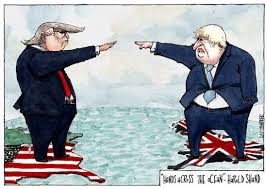 Still can’t get my head around yesterday. In all my adult life yesterday is only the third time I’ve voted for the winning person / option (the other two were voting for Maya in the Camden Council elections). Usually whatever I vote for loses. Maybe I should campaign for Trump to avoid this.
Still can’t get my head around yesterday. In all my adult life yesterday is only the third time I’ve voted for the winning person / option (the other two were voting for Maya in the Camden Council elections). Usually whatever I vote for loses. Maybe I should campaign for Trump to avoid this.

So what kind of thinker are you. Prashant? Independent or idiosyncratic?
Prashant,
Putting aside for a second the dubious arguments on the table (that we will get to argue about hammer and tongs in due course), I’m rather surprised that you aren’t deeply sceptical of a position (any position frankly) where the main leaders are Farage, Boris, Gove and Grayling, and where the leading international supporters are Le Pen, Trump, Giilders and Putin.
I feel you have ended up making a decision on an agenda set by them rather than on a progressive agenda.
Like
1. “Remain will be interpreted as endorsement of the EU’s current agenda for deeper political and diplomatic union and that a remain vote is actually a vote for a much expanded role of the EU.” Except that factually it isn’t, it’s a “walk off with your toys and refuse to play” gambit.
2. The supposed anti-democratic nature of the EU (in contrast to the UK). Apart from neglecting to note that the UK has been an active participant in designing this system, and has regularly fought against more direct democracy in the EU, this seems to ignore the endless attempts by the UK government to introduce remarkably anti-democratic measures over the past 20 years, like curtailment of civil liberties measures post 9/11, that have been stopped by the European Court of Human Rights (admitedly separate to the Commission, but happily bundled in by Boris and co). Frankly the UK “alone”, under the current quite ideological and punitive government, is as likely to resemble Poland as Netherlands without EU checks and balances.
3. “The dangerous bureaucratic nature of the EU”. Jeez, how long since you’ve had to deal with Immigration here (as an outsider anyway)? Talk about vicious 1984 bureaucracies. Or the hopelessly fragmented, inefficient and vastly time-wasting police and court system, that traps poor people who can’t afford a lawyer (and can no longer get legal aid) into sticky webs of punitiveness for what people with money regard as trivial issues. The viciousness of the Uk system against the poor is breathtaking compared to any other OECD country I have ever been to, bar the USA. There are reform agenda everywhere – the allies we need to pummel some equity into the outrageously iniquitous UK system are to be found in other EU countries. But of course there’s a EU reform agenda – a reform that agenda that would benefit 450 million people if successful, and one that is entirely winnable if we were to use the role of the UK constructively, instead of in the ridiculously obtuse and destructive manner most UK interventions have in fact been. A friend of mine was the French negotiation for the treaty extensions in the 1990s – the stories she tells of UK f***-mindedness, especially around any provisions to support equity – and like consumer protection – are amazing. And that continues under the current government, with it’s desperate fight to retain Britain’s right to pay workers sub-human salaries in the cause of industry competitiveness, when the EU momentum has been for improved minimum wages. I mean how can a wealthy country call itself progressive when it has some of the poorest paid people in Europe (on a PPP basis), some of the worst-educated cohorts and extreme inequality? Europe is a pull towards greater equality.
4. We are not “sufficiently European to be governed by the EU” is an odd one.
Larger aggregations are rarely subsequent to senses of identity; rather the reverse.
China is still fighting the battle of separateness vs national identity (I would suggest that a unified China is a selective myth propagated by verious unitist governments).
The USA’s national saccharine and overly constructed, almost comic, myth (cf history of hollywood’s dragooning into this in WW1, WW2 and the Cold War) was promoted to cement various awkward unions, first of competitive coastal settlements post inter-family civil war, then South vs North, then vastly different and massive immigrant groups, etc. The success of that saccharine myth (and its recent counterparty, Trumpism) is testament to the extent that a sentimental appeal to a sense of belonging (throw in a few football chants or State funerals to add sweetness) can trump cool-headed analysis of WTF is actually going on.
The UK identity is yet another one of the constructed myths (for example, the careful nativist creation of the concept of the kilt-clad heroic Scottish highlanger by Sir Walter Scott, an ersatz invention that served to paint over the vicious expulsion of highlanders from grand estates converting to sheep farming. It allowed Queen Victoria to feel OK about living in one of those vast estates where locals had been forced out at the point of a bayonet). I would suggest you have sentimentally fallen prey to an English myth created for an ideological purpose.
Sean